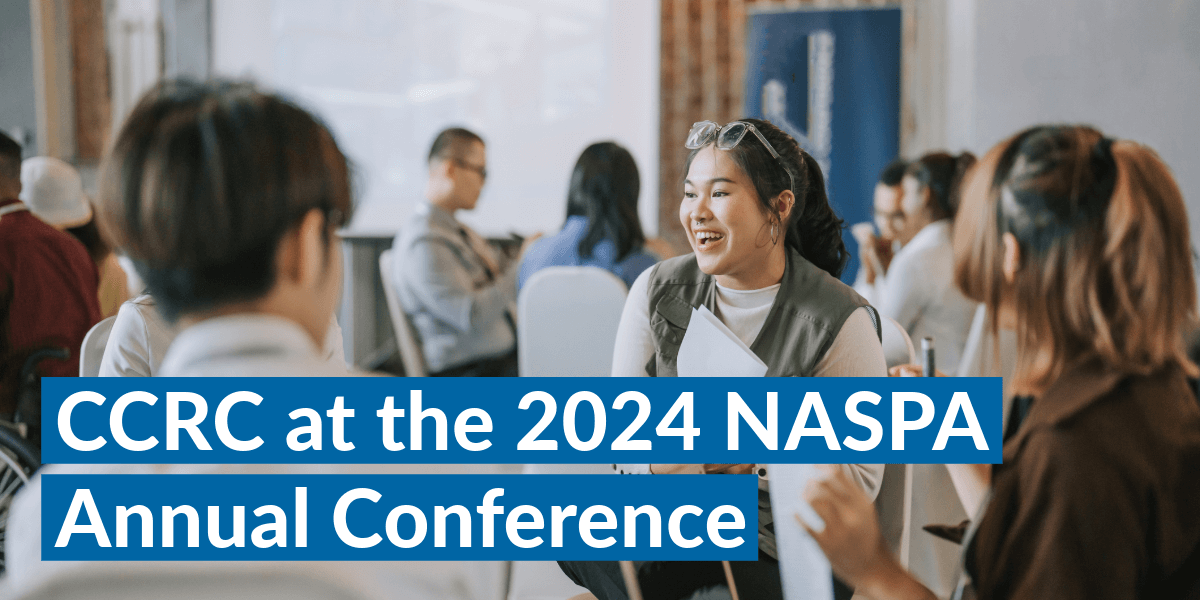The Mixed Methods Blog
CCRC Heads West for the 2024 NASPA Annual Conference

More than 6,000 higher education professionals gathered in March in Seattle, Washington for the 2024 conference of the National Association of Student Personnel Administrators (NASPA). Across five days, attendees joined sessions led by researchers, college leaders, and others focused on how best to navigate issues facing student affairs professionals and higher education institutions today.
Because learning happens both inside and outside of the classroom, student affairs work has the potential to positively impact students’ on-campus experiences. CCRC aims to support student affairs professionals by providing them with evidence they can use to cultivate effective learning environments and more equitable on-campus supports for students.
With this goal in mind, CCRC hosted two sessions at the conference that lent data-informed expertise to student affairs professionals looking to improve students’ college experiences and bolster their success.
First Generation Students and Help-Seeking
This session, led by CCRC Research Associate Andrea Lopez Salazar, shared findings from a study on the support networks of first-generation college students. Based on interview and survey data, the study identified the relationships that first-generation students commonly lean on for support during college—including relationships with parents, siblings and extended family, peers, advisors, and faculty—and explored whom students look to for both academic and personal support. Lopez Salazar emphasized that because relationships both on and off campus shape first-generation students’ journeys, it is important for institutions to recognize where and how these students receive support in order to best meet their needs.

Andrea Lopez Salazar presenting at NASPA
She noted that students were more likely to seek academic support from advisors and faculty, though some reported seeking advice regarding academic skills and on-campus services from siblings and extended family members. For nonacademic support, students said they were more likely to turn to parents and family. Lopez Salazar underscored the importance of first-generation students’ families; though they may not have prior experiences in higher education to draw upon, they carry a wealth of other experiences that can contribute to first-generation student success.
Lopez Salazar ended the session by pointing out that common notions of first-generation status may be too narrow. For example, she shared one case in which a student whose parents completed college outside of the U.S. was reluctant to identify as first-generation despite the fact that they were the first in their family to navigate the U.S higher education system. Lopez Salazar suggested that by expanding the idea of who might need help, institutions can better serve more students who may relate to the experience of traditional first-generation students and thus benefit from targeted support.
Introducing Our Research to Student Affairs Professionals

Aurely Garcia Tulloch speaking with student affairs professionals at CCRC's poster session
In a poster session, CCRC Senior Research Assistant Aurely Garcia Tulloch and Communications Assistant Shay Jenkins highlighted CCRC’s research as a useful tool for student affairs professionals looking to advance equitable practices on their campuses. Over three days, Garcia Tulloch and Jenkins presented on CCRC’s focus areas and promoted the latest findings from three projects relevant to student affairs: projects on Dual Enrollment Equity Pathways (DEEP), improving transfer, and first-generation student supports.
The poster session focused on how CCRC’s research can be applied to the work of student affairs practitioners across sectors, not just those at two-year institutions. In fact, the primary audience of the session was four-year professionals as well as a number of early-career professionals and those making the switch from one sector to another. Many four-year staff members were interested in hearing key takeaways from a recent report that tracks transfer outcomes and were curious about its accompanying data dashboard, which disaggregates transfer outcomes by state.

Aurely Garcia Tulloch, Shay Jenkins, and Andrea Lopez Salazar pose in front of CCRC's poster
The poster session was an opportunity not only to share our research but also to hear from community college professionals about the topics that interest them most. One issue on student affairs professionals’ minds—regardless of sector—was career and technical education (CTE). Many inquired about CCRC’s research in this area and shared that they were eager to improve current CTE programs at their institutions and provide students with more workforce development opportunities.
CCRC extends a thank you to all who were able to join our sessions at the 2024 NASPA Annual Conference. To find us at other conferences this spring—including the 2024 AACC Annual Convention and 2024 AERA Annual Meeting—be sure check out our upcoming presentations!




